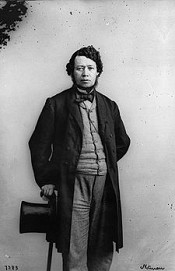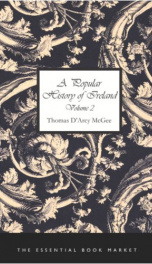McGee Thomas D'Arcy

Thomas D'Arcy Etienne Hughes McGee, PC, (April 13, 1825 – April 7, 1868) was an Irish Nationalist, Irish-Canadian journalist, Father of Confederation, and, to date, the only Canadian victim of political assassination at the federal level. Widely known as D'Arcy McGee, he was born on April 13, 1825 in Carlingford, Ireland and raised as a Roman Catholic. In 1842 at age 17 he emigrated to the United States where he found work as assistant editor of Patrick Donahoe's Boston Pilot, a Catholic newspaper in Boston, Massachusetts. A few years later he returned to Ireland where he became politically active and edited the nationalist newspaper The Nation. His support for the Fenians and his involvement in the Irish Confederation and Young Irelander Rebellion of 1848 resulted in a warrant for his arrest. McGee escaped the country by steamship and returned to the United States. In the US, he founded Irish-American publications in New York City and Boston, and generally supported the cause of Irish immigrants. In 1857 he went to Canada where he set up the publication of the New Era in Montreal, Quebec. Politically active, he advocated a new nationality in Canada, to escape the sectarianism of Ireland. In 1858, he was elected to the Legislative Assembly of the Province of Canada and worked for the creation of an independent Canada. A monument to him stands at Tremone Bay, in north Co. Donegal near the bay from which he escaped to America in 1848. (Beattie, Darcy McGee Commemoration, 1848, p.5) Moderating his radical Irish nationalist views, McGee denounced the Fenian Brotherhood in America that advocated a forcible takeover of Canada from Britain by the United States. A faction of American Fenians sent an invasion force into Canada in 1866 that was repulsed by Canadian forces and arrested by the American authorities. Canadians, with Irish sympathizers in their midst, and spurred by numerous rumours of another, more massive invasion, lived in fear of the Fenians for several years. McGee was elected to the 1st Canadian Parliament in 1867 as a Conservative representing the riding of Montreal West. On April 7, 1868, McGee participated in a parliamentary debate that went on past midnight. He walked to the doorstep of his Sparks St. apartment afterward, and was assassinated by pistol shot. He was given a state funeral in Ottawa and interred in the Cimetière Notre-Dame-des-Neiges in Montreal. The Government of Canada's Thomas D'Arcy McGee Building stands near the site of the assassination. Patrick J. Whelan, a Fenian sympathizer, was accused, tried, convicted, and hanged for the crime. Decades later, his guilt was questioned and many believe that he was a scapegoat. His case is dramatized in the Canadian play, Blood on the Moon. The Canadian folk music group Tamarack's song "The Hangman's Eyes" was inspired by Whelan. The assassination of McGee is also a major component of Away, a novel about Irish immigration to Canada by Canadian novelist Jane Urquhart. There is a monument to him in his native Carlingford, County Louth, Ireland, unveiled during a visit by Brian Mulroney, former Canadian Prime Minister and his then Irish counterpart Charles Haughey. On Sparks Street, in downtown Ottawa, the Thomas D'Arcy McGee Building is a prominent government-owned office building. A pub honouring his name, "D'Arcy McGee's", is situated at the corner of Sparks Street and Elgin Street. Located within walking distance of Parliament Hill, it is a popular watering hole for many politicians. Other locations of D'Arcy McGee's Irish Pub exist in Bells Corners, Ontario, Kanata, Ontario, and at the Ottawa International Airport, having opened on April 1, 2008 in the newly expanded domestic portion of the passenger terminal, and the first US location in 2008 in Tempe, Arizona. D'Arcy McGee has several schools named in his honour including: D'Arcy McGee Catholic School, Elementary, Toronto Catholic District School Board, Toronto, Ontario; and Thomas D'Arcy McGee Catholic School, Elementary, Ottawa-Carleton Catholic School Board, Ottawa, Ontario. In 1986, a Chair of Irish Studies was set up in his honour at St. Mary's University, Halifax. The Quebec provincial electoral district (riding) of D'Arcy-McGee is named in his honour, as are two villages in central Saskatchewan. One of these villages is named D'Arcy, the other McGee, and they are located approximately 20 kilometres apart. Another village is in BC at Anderson lake. Sean Beattie, Darcy McGee a Commemoration 1848, Carndonagh, 1998.
do you like this author?
What readers are saying
What do you think? Write your own comment on this book!
write a commentWhat readers are saying
What do you think? Write your own comment on this author!
write a commentBook list

A Popular History of Ireland : from the Earliest Period to the Emancipation of the Catholics - Volume 2
Series:
Unknown
Year:
Unknown
Raiting:
3/5
The acts of this Parliament, of the 11th of Elizabeth, are much more voluminous than those of the 2nd of the same reign. The constitution of the houses is also of interest, as the earlier records of every form of government must always be. Three sessions were held in the first year, one in 1570, and one in 1571.
Show more
add to favoritesadd In favorites

A Popular History of Ireland : from the Earliest Period to the Emancipation of the Catholics — Volume 1
Series:
Unknown
Year:
Unknown
Raiting:
3/5
Show more
add to favoritesadd In favorites

A Popular History of Ireland : from the Earliest Period to the Emancipation of the Catholics — Complete
Series:
Unknown
Year:
Unknown
Raiting:
3.5/5
Show more
add to favoritesadd In favorites
Book list

A Popular History of Ireland : from the Earliest Period to the Emancipation of the Catholics - Volume 2
Series:
Unknown
Year:
Unknown
Raiting:
3/5
The acts of this Parliament, of the 11th of Elizabeth, are much more voluminous than those of the 2nd of the same reign. The constitution of the houses is also of interest, as the earlier records of every form of government must always be. Three sessions were held in the first year, one in 1570, and one in 1571.
Show more
add to favoritesadd In favorites

A Popular History of Ireland : from the Earliest Period to the Emancipation of the Catholics — Volume 1
Series:
Unknown
Year:
Unknown
Raiting:
3/5
Show more
add to favoritesadd In favorites

A Popular History of Ireland : from the Earliest Period to the Emancipation of the Catholics — Complete
Series:
Unknown
Year:
Unknown
Raiting:
3.5/5
Show more
add to favoritesadd In favorites
What readers are saying
What do you think? Write your own comment on this author!
write a commentif you like McGee Thomas D'Arcy try:
readers also enjoyed
What readers are saying
What do you think? Write your own comment on this author!
write a commentif you like McGee Thomas D'Arcy try:
readers also enjoyed
Do you want to read a book that interests you? It’s EASY!
Create an account and send a request for reading to other users on the Webpage of the book!

